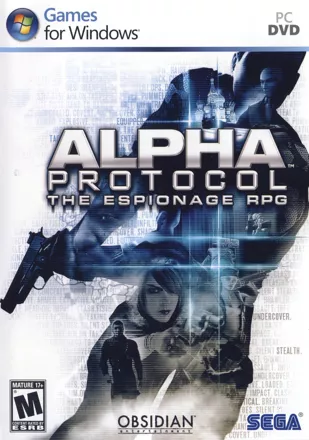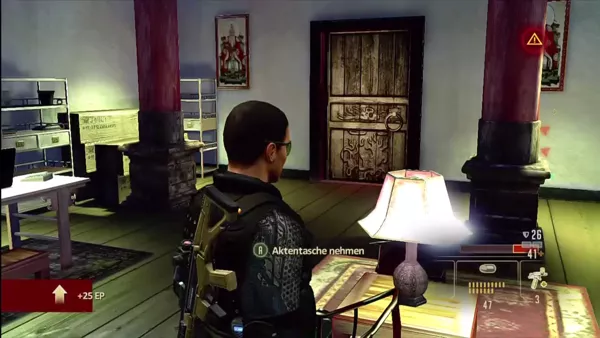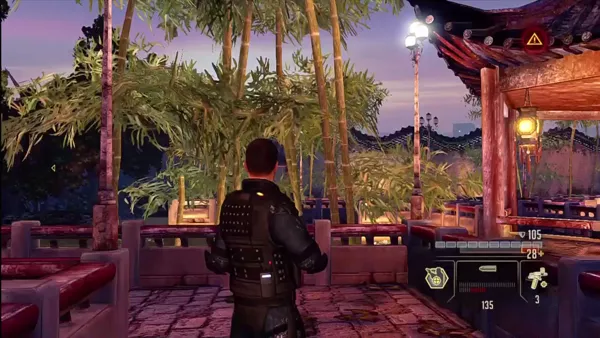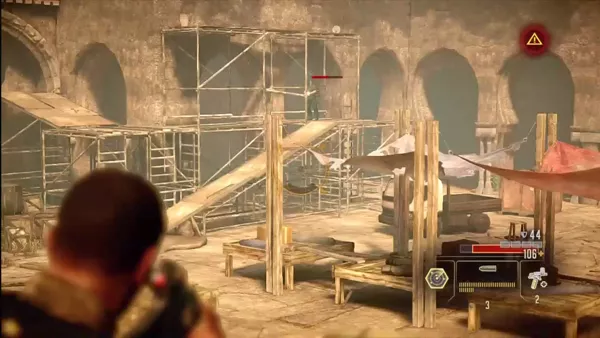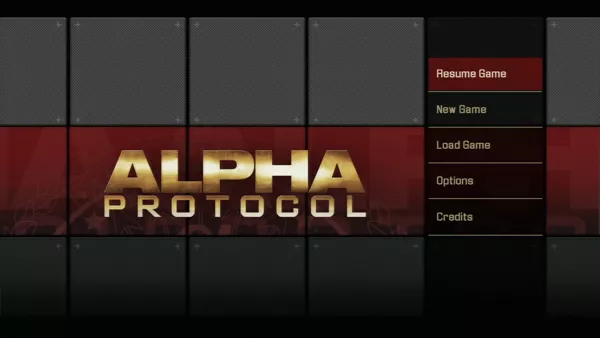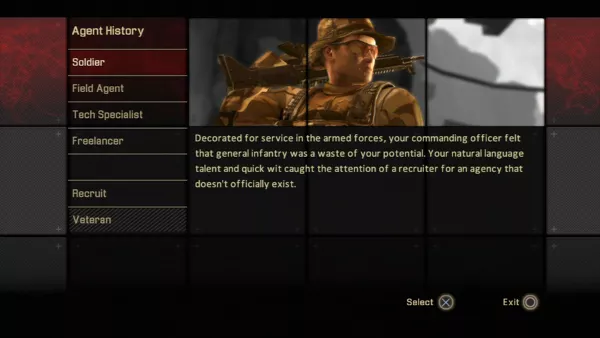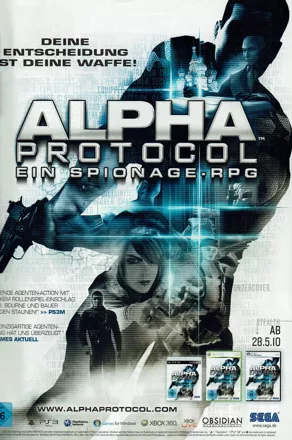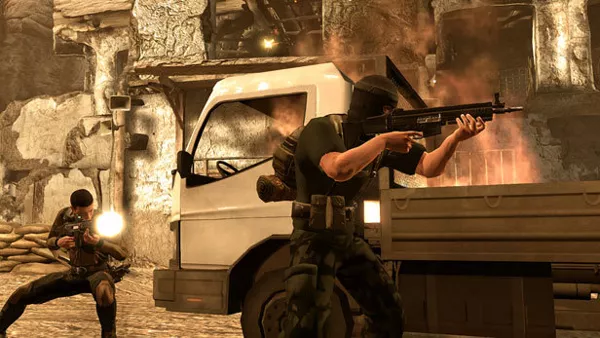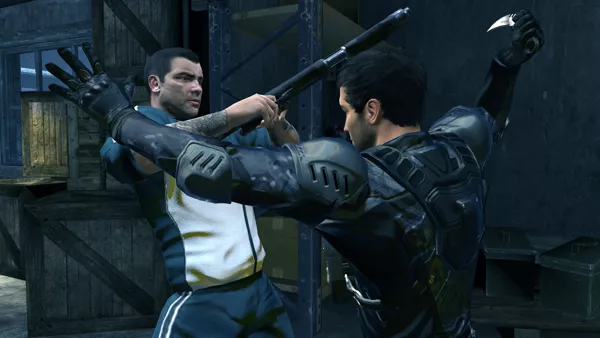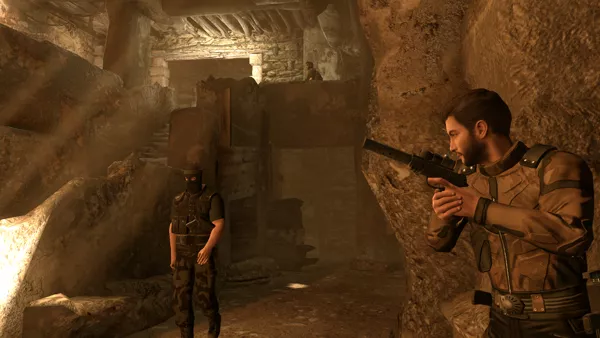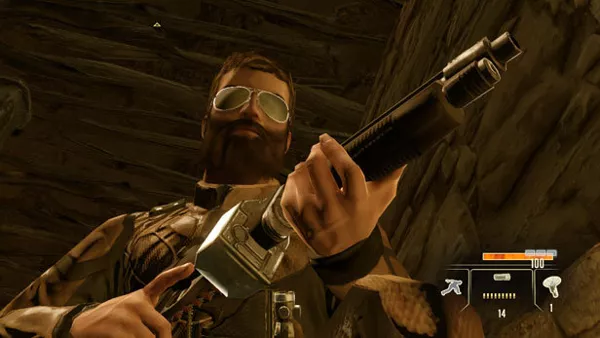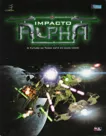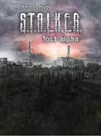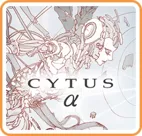Alpha Protocol
Description official descriptions
Michael Thorton. A name without a past. A person whose life before joining Alpha Protocol no longer exists. Alpha Protocol being a clandestine service without any ties to the US government and specialized in covert operations to protect home and country. Thorton's mission: Assassinate the leader of Al-Samad known as "Shaheed". Shaheed's crime: Destroying a passenger plane in the Middle East. An easy task it would seem. But life is never that easy - especially if one has to deal with terrorists. In the end, Shaheed is just the beginning of a greater conspiracy and it's up to Mike and the player to solve it.
Alpha Protocol is a hybrid of role-playing game and shooter, bearing certain similarities to Deus Ex. The player takes control of Michael Thorton after his initiation into the world of Alpha Protocol, looking over his shoulder. At the start of the game, the player has to choose one of four classes (Soldier, Field Agent, Tech Specialist, Freelancer). The choice mostly determines his past as he can change all pre-defined skills before the final start of the game. In addition the player has to customize the basic look of Mike, although during the course of the game he is still able to change his appearance at his safe house and certain lockers scattered around the levels. He is limited to facial features (including color) and clothing, however.
After the first mission, the player advances the story by sending the protagonist to Rome, Moscow and Taipei, in any order. Here, the player is able to select and prepare his next mission in peace. There's a TV which allows the player to keep up with current events (or get new assignments), a weapons locker to choose his load-out with and, more importantly, a computer to check his email and visit the "Clearinghouse". The latter is a black market service where the player can sell stuff he found during missions and buy additional gear (including weapons, armor and special items) or upgrades like a bigger magazine for the pistol. The money needed for that, however, the player has to earn himself. Alpha Protocol doesn't want to be traced back to Mike, so during the missions, the player not only fulfills his given objectives (may they be capturing or killing an enemy or finding intel), but is also on the lookout for money-bags lying around or ways to convince other people to give him some.
The conversation system is somewhat similar to Mass Effect 2, offering several different choices. that do not spell out the whole sentence, but only the tone or topic of the answer. As opposed to the BioWare game, the player only has a limited time to make his/her choice. The amount of available choices the player has greatly depends on how much Mike knows about the person he's facing, increasing the need for him to gather intel before, during and after missions. One way again is the Clearinghouse which also offers ways to make a mission easier like bribing a bunch of guards to not show up for work that day.
Depending on his choice during a dialogue or simply by answering an email a special way and during normal gameplay, not only his relationship with the person he's talking to changes - news of the player's actions travel around the world, changing how enemies and friends alike view the player even before their first encounter, making it sometimes easier or more difficult for Mike to persuade his opponent. Every person in the game even reacts to certain kinds of attitudes better than others. Being suave to Mina (another employee of Alpha Protocol) may seem a good idea at first but she's more into the professional type for example.
If all fails and on his way to the main target, Mike has several other options to deal with a situation, the most obvious one being to pull out one of his several different types of guns and shoot his way through the mission. But even then just going in and pulling the trigger is mostly a waste of ammo as taking the time and aim increases not only the accuracy but also the change to score a critical hit. If the player is more of a peaceful and/or sneaky nature, he can however take the stealth-route. This allows him to make one-hit take downs of an unsuspecting enemy as well as avoid many obstacles. Especially sneaking around involves a lot of hacking, lock-picking doors and rerouting electronics to go around enemies, stop alarms or just get additional intel. Each of these tasks involves a small mini-game which increases in difficulty as the player advances through the game.
Each kill, hack, successful dialogue and completed mission objective earns Mike experience points which in turn allow him to level up and earn advancement points. These are used to upgrade the nine available skills like "Stealth" or "Assault Rifles" up to 10 times. If a skill is completely upgraded, the player can then choose to specialise it, unlocking 5 additional ranks to dump points in. This can, however, only be done for three skills. Investing points into a skill unlocks both permanent bonuses like less recoil when using a pistol to special abilities. "Awareness" for example is a stealth-ability which allows the player to see all enemies and which direction they are currently facing even through walls. At higher stealth-ranks, this effect becomes permanent.
Groups +
- 3D Engine: Unreal Engine 3
- Gameplay feature: Character development - Skill distribution
- Gameplay feature: Dating / Romance
- Gameplay feature: Lock picking
- Gameplay feature: Multiple endings
- Gameplay feature: Time manipulation
- Games for Windows releases
- Games pulled from digital storefronts
- Games with game-altering copy protection
- Middleware: Beast
- Middleware: CRI
- Middleware: SpeedTree
- Physics Engine: PhysX
- Setting: 2010s
- Setting: City - Moscow
- Setting: City - Rome
- Setting: City - Taipei
- Setting: Country - Taiwan
- Setting: Museum
- Setting: Ship / Boat
- Theme: Hacking / Pseudohacking
Screenshots
Promos
Videos
Add Trailer or Gameplay Video +1 point
See any errors or missing info for this game?
You can submit a correction, contribute trivia, add to a game group, add a related site or alternate title.
Credits (Windows version)
534 People (467 developers, 67 thanks) · View all
| Project Director | |
| Senior Producer | |
| Producers | |
| Additional Production | |
| Marketing | |
| PR | |
| Lead Designer | |
| Level Design Lead | |
| Systems Design Lead | |
| Designers | |
| [ full credits ] | |
Reviews
Critics
Average score: 64% (based on 93 ratings)
Players
Average score: 3.6 out of 5 (based on 77 ratings with 3 reviews)
So rough you can't see the diamond
The Good
Obsidian tries to establish itself as BioWare's main competitor in the field of modern story-driven RPGs. The games they had made so far proved they were a worthy heir to the venerable legacy of Planescape: Torment. Yet with all their undeniable quality, all their games were sequels, built upon the formulae created by their predecessors, the first installments in Knights of the Old Republic and Neverwinter Nights series. Alpha Protocol is their first completely original, independent product.
To the best of my knowledge, Alpha Protocol is the first RPG ever that is set in our time and contains no sci-fi or supernatural elements at all. Try to walk down your memory lane, invoking images of great RPGs: they all have something that cannot happen in real life. Alpha Protocol has no monsters, magic, mutants, robots, or anything of the kind. To make a RPG that is rooted entirely in our reality was a bold, unprecedented move. Obsidian deserves praise for this decision.
It is obvious that the creators of Alpha Protocol put a lot of effort into designing "choices and consequences" - in the modern sense of selecting dialogue lines that lead to different results. For the most part, they did a really good job. Every person you associate with changes his or her attitude towards you depending on your behavior towards this person. And the game is built in such a way that you can never satisfy everyone.
Those decisions rarely feel like the easily classified "good versus evil" problems of earlier BioWare titles. Kill a terrorist, arrest him, or let him speak to hear his side of the story? What is more dangerous - a riot or an assassination attempt? There is a suspect: should I just shoot him, perhaps preventing further bloodshed, or should I consider the possibility that he might be innocent? One of the toughest decisions in the game: your friend is about to be executed, but in another place a bomb is going to explode, killing many innocents. Whom do you save?
The choices you make may affect later missions and dialogues. The game begins with a conversation between the protagonist Michael and the antagonist Leland, and this conversation serves as a frame for all the events they discuss. I was pleasantly surprised to see how the dialogue changed depending on the decisions I have made before Michael reported the events to Leland. You see a different picture of the hero and the world around him depending on how you handled the tough, morally ambiguous situations he found himself in. What's more, all such decisions are timed, which adds a realistic tension to those uneasy moments.
Alpha Protocol has a good diversity of locations. The game is a "globe-trotting" adventure, sending the hero to four very different countries: Saudi Arabia, Taiwan, Russia (Moscow), and Italy (Rome). Each country typically contains five-six missions, each mission being set in a different location. The locations include familiar urban environments such as subway station or hotel, outdoor areas, and even such exotic places as a villa designed in the style of 1980's disco.
As for the actual gameplay, it's pretty much your standard third-person shooter fare with role-playing specializations (hand-to-hand combat, firearms, stealth, etc.). Those work fairly well, and it does feel rewarding to develop an unstoppable first-heavy son of a bitch or a sneaky bastard out of your hero. To those who complain about weak pistols in the beginning of the game I can only say that this is an RPG: if you are not weak in the beginning of a role-playing game there is hardly any point to play it. Invest points into talents, build up, and you'll be fine.
The Bad
Alpha Protocol is plagued by a myriad of problems, big and small.
Okay, first of all, let me get this off my chest: why is it so that every bloody modern RPG has to have minigames? Which game started that, anyway? Final Fantasy VII? Well, just for the record, the minigames in that game were diverse, fun, and - with a few exceptions - non-obligatory. I'm feeling a different influence here: Mass Effect. It almost looks like the folks at Obsidian decided to imitate whatever the Big Brother's newest and flashiest titles did wrong. And minigames is unfortunately just one of those things. Mass Effect had minigames? Okay! Let's populate all the levels of our new game with minigames. Only this time, let's turn every objective in the game into one of the three possible minigames! Need to download data? Quickly match text fragments! Need to disable security? Quickly match text fragments! Need to disarm bombs, stop the villain and save the world? Quickly match text fragments! Very exciting, eh?
"It's not a big deal", - you'd say, but I'll say yes, it is a big deal, because stupid optional minigames are okay, but even the most intelligent compulsory minigames are not okay, because they turn the entire game into a series of identical exercises. And the problem here is that those minigames are just part of Alpha Protocol's very serious flaw: level design.
The locations are varied in that they mix indoor and outdoor areas with diverse architecture and environment. The problem is that they are built out of identical components. It's not just the problem of aforementioned mission objectives taking the shape of woefully repetitive minigames; there are similar challenges, similar enemies, and similarly artificial, linear layout. Remember how Deus Ex had those huge levels with different challenges? Well, there is nothing of the sort in Alpha Protocol. A few tiny areas behind locked doors (which you can unlock - you've guessed it - with a minigame) is all you've got here in terms of exploration; otherwise, all the locations in this game are a straight line from A to B. By the way, that was also one of the weakest aspects of Mass Effect. But that game had space travel and optional locations on planet surfaces to partially make up for this deficiency.
Let's move on. Mass Effect drastically reduced the size of non-combat areas, where you could just walk around, talk to people, explore, etc. What does Alpha Protocol do? Removes those areas completely! That's right, in the entire game there is not even one friendly location; with the exception of the safe houses where you are alone, you'll spend the entire game in combat areas. This is a return to dungeon crawlers at their most primitive - except that good dungeon crawlers had complex, challenging mazes, whereas Alpha Protocol has disjointed, weekly designed third-person shooter levels. Forget about "world map", forget about exploration - in this game, all non-combat activities (shopping, receiving missions, etc.) are performed in your house. Did you want to explore Taiwan, Rome, and Moscow? Tough luck - all you are going to explore are linear levels full of enemies. There is no sense of a world in this game, just a bunch of locations slapped together. Many regular shooters have larger, more continuous worlds than this.
There are also plenty of technical issues (the camera that begins to jerk maniacally at the beginning of each area comes to mind). The visuals are, to put it mildly, unappealing and lack vibrancy and artistic touch. Combat exhibits all sorts of hiccups and quirks, and the overall balance is greatly compromised by relentless bosses that respond well only to combat-trained heroes and completely ignore those achievements in cunning stealth you were so proud of.
Last but not least: the story is not great at all. It is banal in concept and predictable in execution. There is hardly any significant plot development worth mentioning, and the whole thing boils down to the very, very old "kill the big bad guys" formula. It's a shame that the same people who wrote the magical story of Mask of the Betrayer descended to the level of hackneyed conspiracy theories and trite premises such as "big corporations are evil". Characters sorely lack warmth and charisma and are, at best, eccentric, bordering on cartoony. They aimed for a realistic setting but found nothing better than decorating it with a completely "videogamish", "pop culture" story without any depth or credibility. They'd be better off populating their world with robots, mutants and half-orcs.
The Bottom Line
Alpha Protocol has interesting ideas and can at least boast a somewhat unique blend of role-playing-imbued shooting within a modern-day, realistic setting. However, among its numerous flaws are severe restrictions imposed on exploration coupled with a particularly weak level design, which largely ruined the experience for me.
Windows · by Unicorn Lynx (181775) · 2015
A 2020 Review - Alpha Protocol (PC, 2010)
The Good
- Character progression and leveling are rewarding and leave you excited to play further.
- Shooting the AI like fish in a barrel. It's also a barrel of fun.
-
Reputation system makes conversation and dialogue choices all the more interesting.
-
While minor - cool thematic settings, locations, and safe houses. They breathe some extra life into the game.
-
Great and fitting characters. While there are some exceptions, most play their part well and add an extra bit of intrigue.
-
Unique concept we don't see enough of. Spy action RPG.
The Bad
- AI is absolutely dreadful and brain dead. -
Unfulfilling ending conclusion. Especially with the characters outside of Michael.
-
Dialogue options can feel shallow and limited. The responses based on options can be a bit off.
-
The main character, Michael Thorton. I just don't like him.
-
Bugs & Crashing are a present and occurred numerous times.
-
Limitations of stealth and the options to employ it.
The Bottom Line
Score: 6/10
Mediocrity Score: Mediocrity on a Good Day.
While taking it slightly out of context - Christian Donlan with Eurogamer describes it best, "[Alpha Protocol is] a contemporary super-spy mod of Mass Effect...".
Tags: A few words or tags that come to mind are: entertaining, anticlimactic, buggy, bittersweet.
Avg. Time to beat: 13 hours
Quickest Speedrun: 1 hour, 39 minutes
Ten years after its release, Alpha Protocol still sneaks by with a passing grade. A spy thriller, action role-playing game from Obsidian Entertainment casts Michael Thorton as the spy protagonist. Diving deeper into the world, you'll be split between safe houses in Taipei, Rome, and Moscow where you'll execute various missions. While I found this title to be quite buggy and shallow in some respects, it still managed to entertain and amuse its way into my recommended list - even if narrowly. Many accounts have detailed the many missteps between Obsidian and Sega, but ultimately lack of direction and organization is what led to this release not being more of a slam dunk. Alpha Protocol has entertaining gameplay and the narrative, characters, and dialogue hold up well. Unfortunately where it sags down is in its lack of depth. Many components or aspects of the game either feel shallow and unfinished, or appear to be directly lifted and shifted in from other games (like Mass Effect in terms of leveling up, skill progression, and combat). I feel much today about this game as I did the first time I played it. And In a way, it's satisfying to see that my opinions on some things don't change through the years. I just wish in the case of Alpha Protocol, they weren't so bittersweet.
Concept: A spy thriller, action role-playing game starring Michael Thorton as a special agent and our main protagonist. Working for a secret government agency, Alpha Protocol, Michael takes on missions from various safe houses around the world conducting covert operations. It is dialog and choice heavy, and it does feel like your choices have an impact on the narrative - even if it's minimal. A big part of the combat is the use of gadgets, active skills, stealth, and tactical coverage. I'll hand it to Obsidian for thinking outside of the box and coming up with a lot of really interesting ideas for gameplay, freedom, and pacing.
Graphics: Dated by 2020 standards, but not uncomfortably so. Nothing is wowing, but it holds up well enough for a game that started development some 14 years ago. Although if memory serves me right, this wasn't too wowing in 2010 either. The good news is, it is not very graphics demanding and can be played on budget gaming systems. Michael's face, expressions, and animations could have been better. Michael, in general, could have been better, graphics aside. The ragdoll death physics are amazingly exaggerated and makes watching Michael die even more enjoyable.
Sound: Voice acting is done well, except for Michael who is often very stiff and bland sounding. I've had breakfast cereal with more personality. SFX audio overall is sufficient. Alarms are constantly going off in the game, and while they have at least localized the noise somewhat, it is very annoying none-the-less. The soundtrack was average with the most notable track being played on the main menu screen. I'm not sure that it is bad, but it sounds strongly early to mid-2000s and quite campy.
Gameplay: Character customization allows for some flexibility within the different skill paths you can choose from throughout the game. Unfortunately, the game is not long enough to permit enough points to play an effective jack-of-all-trades, so stack up only 2-3 skills. Alpha Protocol employs a series of minigame challenges for accomplishing certain tasks like lockpicking, bypassing, and hacking. Unfortunately, these are mostly annoyances. Bypassing is an atrocity against gaming, especially in the later levels. One of the most disappointing aspects of the game was the amount of bugs and fatal crashes. Enemy AI is dreadfully bad and exemplifies what not to do when designing enemy combatants. Combat reminds me of Mass Effect. Aiming and bullet spread are overly interpretive and frequently seem amiss. A decent portion of the cover does not protect you and will get you quickly killed. It again makes you, the professional secret agent spy, look less like James Bond or Jason Bourne and more like something Leslie Nielson or Steve Carell would be cast to play. Clumsy, amateurish, and down-right careless often describes what Michael Thorton must look like to the enemy shortly before he kills them.
Entertainment: Alpha Protocol is such an odd experience in that I found it entertaining and wanted to keep playing but on a component level, I found a mess of problems across the board. I think the entertainment in Alpha Protocol ultimately boils down to getting more stuff so you can kill more bad guys, rinse and repeat. Multiple weapons, armor, and gadgets; Lots of which can be upgraded or modified in some way. As you level up and your skills refine, you can really feel the difference in combat and gameplay. It does get a bit repetitive at the end of the game which felt appropriately long. Overall I found the game to be quite entertaining. All issues aside, I still enjoyed Alpha Protocol and would recommend it. Just keep your expectations realistic if not low.
Replayability: Obsidian has provided reasons for you to replay like different dialogue choices, or different character builds. Multiple replays are a must to catch all of the content, especially the other perks maxed skills can provide. Plus, one playthrough you can be a professional by-the-book spy who plays it safe and the next playthrough you can be a suave womanizer who offends everyone and abides by no rules. Both playstyles can bring you to the finish line. The problem is that I don't find any of it compelling enough to go back through. I don't see that there is any missed content that I'd benefit from obtaining. Don't get me wrong, it's a fun game, but I didn't find its lore or story captivating enough to go back through so soon.
Cheats??: Unsure. I did not seek out any as easy mode was a breeze as is.
---Elaborations & Extras---
Characters: The cohesion of characters, settings, and scenes are all an above-average amount. The over-arcing story wasn't that interesting to me, but the progression in relationships and subplots kept me curious and entertained enough to power through. They work well together and help hold up the game when it becomes repetitive and wears thin at points. Unfortunately, this comes crashing down in its conclusion when the majority of the characters are unmentioned in any way that felt satisfactory. I found Michael Thorton to be a rather stiff and annoying character, which is why I opted to dress him like some pro-fisherman southerner who's a NASCAR enthusiast. If my character is going to act like a second-rate spy, why not go full tilt with it? Strangely, Michael seemed less stiff and weird after adding the pro-bass-fishing reflective shades. I honestly think it has something to do with his eyes. Something about them is wrong.
Systems & UI: Alpha Protocol provides a reputation and dialogue positioning system which impacts your relationships with characters throughout the game, as well as directly within live conversations. Some of this becomes a moot point as many of the characters are never seen again and don't get any kind of fulfilling follow-up at the end of the game. While there are choices in dialogue, I found in most situations a professional-stance wins. Humorous, suave, flirtatious, or aggressive can be risky moves. Even if the others bring negative reputation, sometimes the cringy awkwardness of your character failing socially is quite enjoyable. Alpha Protocol employs a series of minigame challenges for accomplishing certain tasks like lockpicking, bypassing, and hacking. Unfortunately, these are mostly annoyances. Alarm and door bypass minigames are downright miserable and should have been removed from the game. I found lockpicking to be simple but fun and hacking to be a nice challenge.
Character Progression & Leveling: Character progression and leveling up are a genuine pleasure in the game. It feels like a treat each time you advance your existing effectiveness, improve a skill, or add a new skill/power. It makes running back into combat or another mission all the more alluring so you can check out the new stuff you might unlock at the end. The combat itself, while greatly flawed, is still very enjoyable and fun to try and perfect. Character customization and focus allow for some flexibility within the different skill paths. Unfortunately, the game is not long enough to go for a jack-of-all-trades build. I'd suggest focusing on 2-3 skills, with two of those being your weapon classes, and the third being a mix of stealth, sabotage, and technical aptitude.
Dumb AI: Shamefully bad AI. It's a mess. Some stand in-place glitched out, some stand in-place out of cover shooting at you, others run around aimlessly occasionally hailing gunfire your way, some lob endless grenades towards you, and for the strangest reason some enemy AI, with a pistol in hand, will charge you head-on to punch you just once, and then will begin shooting you at close proximity. It is horribly ill-fitting for a spy game that takes itself pretty seriously. Stealth is super inconsistent. Sometimes you can have a whole gun battle between a few guys and no alarm trips. Step on an eggshell, and the alarm goes off.
Bugs: One of the most disappointing aspects of the game was the amount of bugs and fatal crashes. Perhaps it is due to the advances in technology and drivers versus the age of the game, or maybe it is because the game has always been this way - either way I ran into many issues. The game crashing and freezing is most common. Getting stuck in the map or body physics-related were also frequent. Luckily, the vast majority of the game crashes were while exiting the game to the menu or exiting the game to the desktop. So, minimal risk/impact. Admittedly, the body or ragdoll physics are mostly hilarious. One enemy combatant died in a doorway that another enemy closed at the same time. The dead corpse got stuck in a weird starfish position just convulsing and wiggling around stuck inside the door. I laughed really hard at this. Also, every time Michael does is pretty enjoyable simply due to the over-exaggerated physics. Especially when it's death by explosion. I know, it shouldn't be praised but I'll be damned if I didn't say it made me laugh.
Conclusion: Alpha Protocol is almost exactly how I had remembered; good but not great. A lukewarm, bittersweet, "so close" kind of game. It got some things right, but did a lot wrong - or sometimes even really wrong. Part of what makes Alpha Protocol good is it taking a different approach in being an action spy RPG adventure that has a skill map and leveling up involved. Very standard fare for modern fantasy games, but not for action games and certainly not any spy ones. It's just such a cool and refreshing genre and idea. Unfortunately, that alone is not a sufficient selling point to lure people into playing. It had a rough time during development and had to be majorly redone in parts. I think it shows through in many spots, but for the most part, holds up. I'd fully support either an HD re-release or a new title in the series.
If you're wondering where Alpha Protocol can be purchased, sales for Alpha Protocol halted in Summer 2019 due to expired licenses for music within the game.
If you have any interest in gaming history, I strongly recommend the following article which provides back story and interviews with the developers about the making of the game. It's quite a fascinating read that highlights why some aspects of the game seem so messy or poorly thought out.
https://www.eurogamer.net/articles/2017-09-06-the-making-of-alpha-protocol-obsidians-secret-best-rpg
Thanks for reading!
Windows · by WONDERなパン (16461) · 2020
The Good
Sneaking around and trying to avoid enemies is a lot of fun and requires a lot more skill than simply firing your way through the levels. The game also rewards going through levels without alarms going-off or enemies dying, which is a good way to stimulate the player to act like a real spy. I also liked how you could upgrade your stealth, so you would receive bonuses that would prove invaluable to people who aren't that good at stealth, this made using stealth a lot easier for people who are used to shooters.
A lot of this game made a lot of sense to me, like how you shouldn't be able to spend government funds during undercover missions and how it was often a better idea to offend people in order to keep their feelings from interfering with the missions. This made me feel like the developers took their time to figure out how to make the premise of a secret government agency work, this is also interesting material for the story because people will often offer you better jobs by promising a different treatment.
The Bad
While sneaking is the most interesting mechanic in this game, it feels like it also has to be an action-game and that you can't possibly have a climactic boss-fight without cover-based combat. This thought is probably what killed the game for me. Whenever you have to fight a boss character he will run around the room and fire bullets at you that have four times as much impact as they normally do, they avoid every gadget you throw at them and you can't use stealth. Unless you focus all your points into weapons and toughness, there is no way to make it past these boss-fights without a ton of luck.
If you did focus all your points in combat-related skills you will have a hard time during missions, when you are forced to hack computers and open locked doors. Sometimes stealth is a requirement because there are enemies around that you aren't allowed to kill because they are innocent (cops, government-officials, etc.). The best way to do this kind of game would be to have different ways to complete your task, but apparently the producer's thought this was the better way. Consider this an expansion on the problem I mentioned in the previous paragraph because it's pretty much the same problem.
At first I wanted to praise the story because I personally thought it wasn't that complicated, but then I realized that I just looking at the summary of it. I wanted to say that the story was just about a government agency licking the boots of a military contractor and that you, an ex-agent, has to expose their boot-licking, but that meant I was ignoring almost everything. There are a dozen factions involved, some of which were only mentioned once or twice like the inappropriately named NSB (Dutch Nazi-party?) and all the characters are a mess of secrets and conspiracies. Aside from Steven Heck, there was just nothing amusing about this story.
This game wants to be James Bond so bad, that I feel sorry for it. The music in the boot-menu already sound very Bond-ish to me and I swear some of the locations reminded me of levels I played on the Nintendo Game-cube (like one in a big mansion full of paintings). I don't understand why Obsidian didn't just make this a bond-game, I am sure that whoever owns the rights to these games would be very impressed by this game's depth.
I don't get why every gun-type is considered a separate skill and the game constantly throws items at you for guns you don't use. Who in the world is ever going to pour all his points into shotguns? A shotgun only works on short-range, what are you going to do when you have to fight in an open-field?, cry in a corner? It would have made much more sense to have skills like "precision" or "Rambo" that change the ways you use the guns and this would also make it easier to switch to a secondary weapon.
The Bottom Line
While sneaking around and putting knives into people's throats is a lot of fun, it's not enough to save this game from the sinking ship it's chained to. You can't offer people to focus on gadgets and sneaking, but still confront them with boss-fights people can only win by shooting at them until their incredibly long health-bars disappear. That and the lack of a decent story and the constant feeling that you are playing a different, much better game (James Bond) are what kills this game for me.
I didn't finish this game because I abandoned it when I had to fight a boss that would kill me if I wasn't in cover for six seconds and was constantly sending the same pesky soldiers after me. This wouldn't have been such a big deal to me, if I wasn't forced to run through the part before this boss-fight, firing at enemies like I was crazy, just because there was a time limit and I didn't have any long-range weapons that could help me with the goons that waited for me across the mine-fields . I was having fun for a while, but eventually that sinking ship will catch up with you.
Xbox 360 · by Asinine (957) · 2011
Discussion
| Subject | By | Date |
|---|---|---|
| How to play it next? (Spoilers inside) | Slug Camargo (583) | Jul 10, 2011 |
| Boss fights >:( | Slug Camargo (583) | Jun 6, 2011 |
Trivia
Sales
Alpha Protocol sold 700,000 copies in just over a month after release in United States and Europe, a performance considered slow by publisher SEGA.
Awards
- 4Players
- 2010 – #3 Best Role-Playing Game of the Year* Play
- June 2010 - #1 Most underrated games so far this year
Analytics
Upgrade to MobyPro to view research rankings!
Related Sites +
-
Alpha Protocol
Official website (Multilingual) -
Alpha Protocol: das Spionage-RPG
A German fansite with information about the game -
PS3trpohies.org
Trophy guide for Alpha Protocol. -
Wikipedia: Alpha Protocol
article in the open encyclopedia about the game
Identifiers +
Contribute
Are you familiar with this game? Help document and preserve this entry in video game history! If your contribution is approved, you will earn points and be credited as a contributor.
Contributors to this Entry
Game added by Sicarius.
OnLive added by firefang9212. PlayStation Now added by Sciere.
Additional contributors: MAT, jean-louis, formercontrib, CalaisianMindthief, Patrick Bregger, Starbuck the Third, Plok, Kennyannydenny, 64er.
Game added July 13, 2010. Last modified March 20, 2024.
